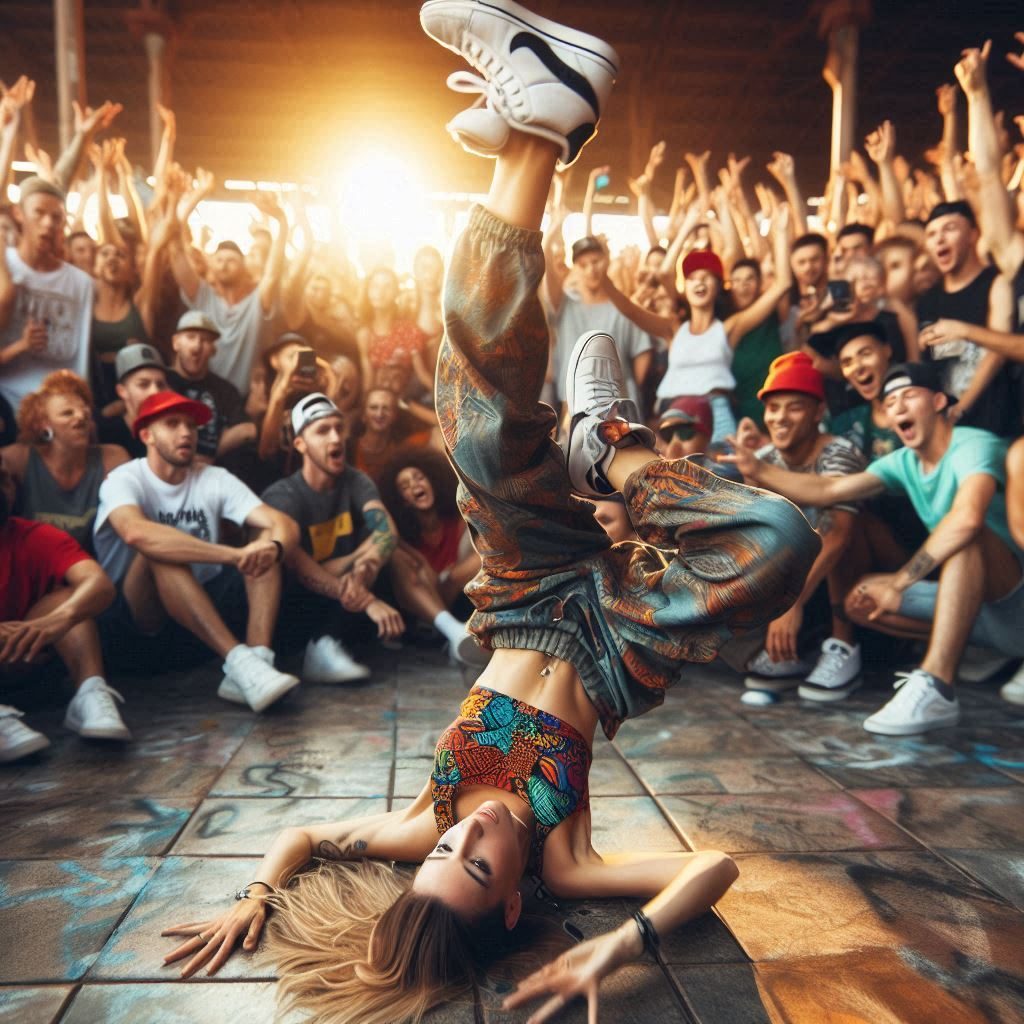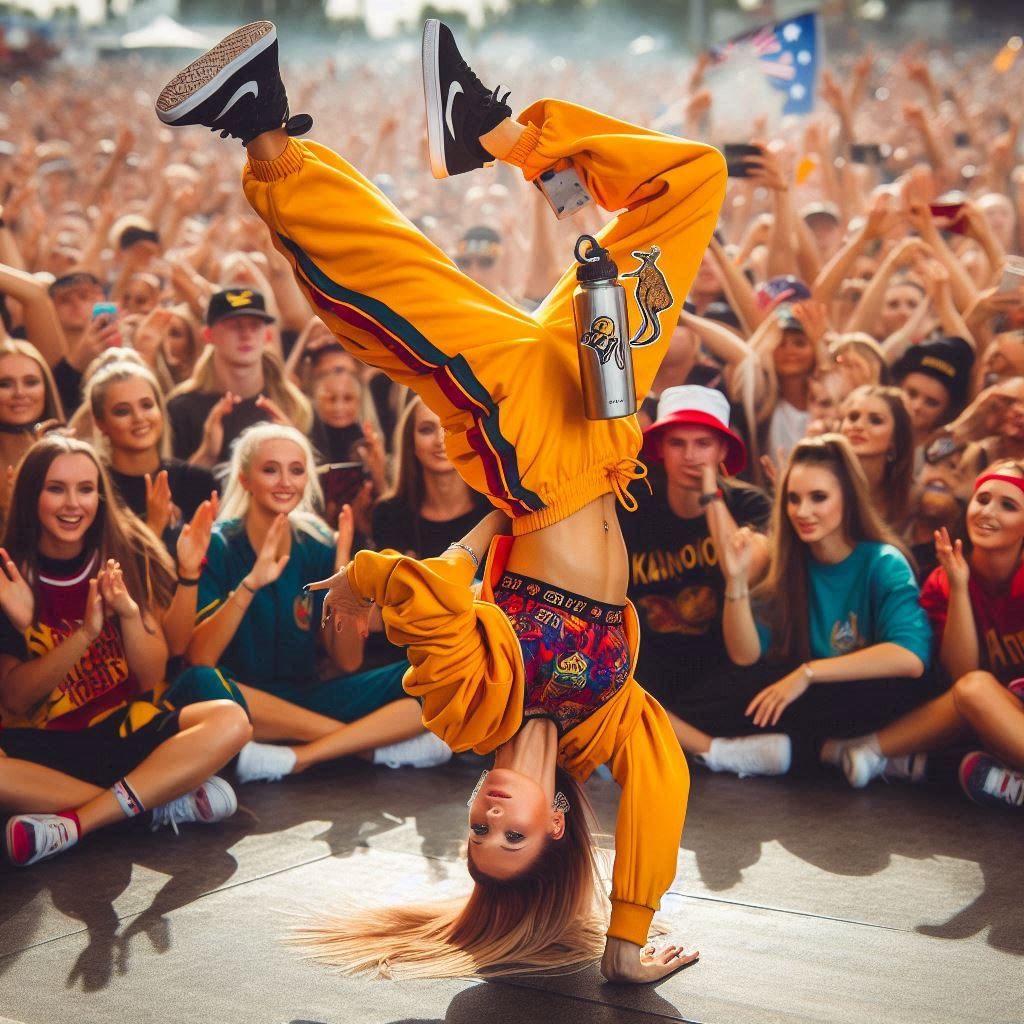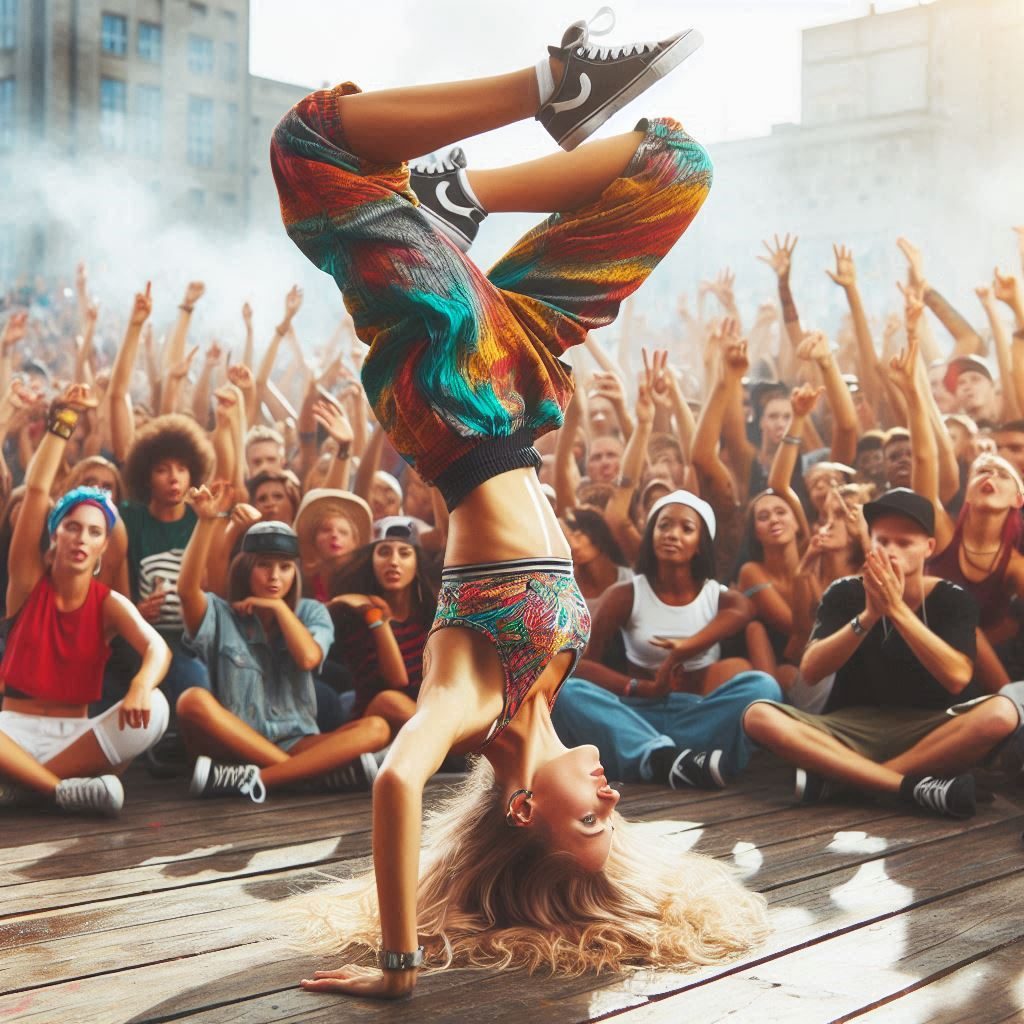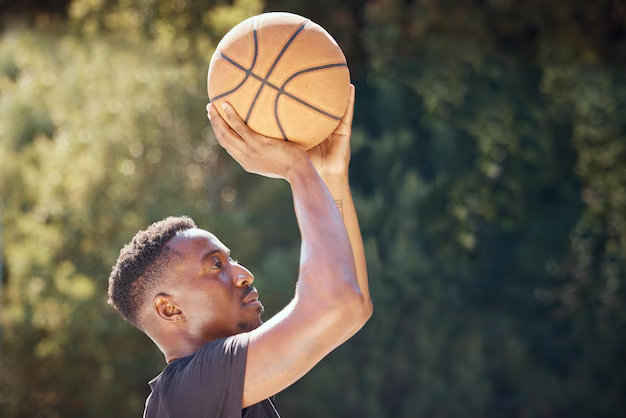Rachael Gunn’s Olympic Performance Media Failure
Why Rachael Gunn’s Olympic Performance is Being Mocked, Especially by Australians?
What is more embarrassing than Rachael Gunn’s Olympic Performance or how the media and news react to a story and bully an athlete for trying? This poor-quality media idea of virtual bullying seems to be acceptable to all. I am not embarrassed by Rachael Gunn’s Olympic Performance but I am appalled & concerned by the media standpoint on this issue. The hypermasculine media approach to misogyny is pretty amazing for both males and females in the industry.
The 2024 Paris Olympics introduced breaking, a form of street dance, as an official sport. Representing Australia in this new category was Rachael “Raygun” Gunn, a 36-year-old lecturer and experienced breaker. However, her performance quickly became a subject of widespread criticism and mockery, particularly from Australians. But what led to this reaction?
The Performance and Its Reception
Rachael Gunn’s Olympic routine was distinctive and unconventional. She incorporated elements that mimicked Australian animals, such as kangaroo hops and sprinkler moves. While some found these touches creative and endearing, her performance did not score any points with the judges, resulting in a series of losses in her round-robin contests. This zero-score outcome, combined with her unique style, made her an easy target for online trolls and critics.
The Attire Controversy
One of the most mocked aspects of Gunn’s performance was her choice of attire. Unlike her competitors who wore streetwear, Gunn opted for a green and yellow Australian Olympic tracksuit. This decision led to comparisons with a “high school PE teacher” and further fueled the ridicule. Critics argued that her outfit did not align with the street culture typically associated with breaking, making her appear out of place.

The Qualification Debate
Another point of contention has been Gunn’s qualification for the Olympics. Some questioned how she managed to secure a spot in such a prestigious event. Despite winning her qualification fair and square at the Oceania qualifier in Sydney, many felt that her performance did not reflect the level of skill expected at the Olympics. This skepticism added to the narrative that her participation was a “travesty” and a “farce.”
Misogyny and Social Media Backlash
The criticism directed at Gunn has also highlighted issues of misogyny in sports. Australian Chef de Mission Anna Meares defended Gunn, pointing out that the harsh comments were a typical example of the misogynistic abuse faced by female athletes. Meares emphasized that Gunn’s courage and character should be celebrated, not ridiculed. Gunn herself responded to the backlash by encouraging others to embrace their uniqueness and not be afraid to stand out.

Rubbish Media Stories That Bully To Get Views.
——————————————————-
The Double Standards in Australian Sports – Mockery and Misogyny vs. Cheating
In Australian sports, a troubling double standard often emerges. Female athletes, like Rachael Gunn, face intense scrutiny and mockery for their performances, while male athletes who engage in cheating often receive more lenient treatment. This disparity highlights deep-seated issues of misogyny and societal expectations in sports.
Mockery and Misogyny Towards Female Athletes
Female athletes in Australia frequently encounter harsh criticism and ridicule, often rooted in misogyny. The sports media landscape is predominantly male, with men writing the majority of sports stories and being the primary voices quoted. This male-dominated environment perpetuates gender biases, making it challenging for female athletes to gain the same respect and recognition as their male counterparts. Women in sports are often judged not only on their performance but also on their appearance and behavior, leading to unfair and sexist treatment.
The Leniency Towards Male Cheaters
In contrast, when male athletes are caught cheating, the response is often more forgiving. High-profile cases, such as the ball-tampering scandal involving Australian cricketers, sparked outrage but also saw a significant portion of the public and media eventually rallying behind the players. This leniency can be attributed to the deep cultural connection Australians have with their sports and the athletes who represent them. Male athletes are often seen as embodying national pride and identity, which can lead to a reluctance to tarnish their reputations permanently. Is Australia & Australian Media misogynistic?
Beyond Gender – A Widespread Issue in Australian Sports
The issue of mockery and unfair treatment in Australian sports extends beyond gender. Both male and female athletes face criticism and scrutiny, though the nature and intensity of this treatment can vary. This widespread issue highlights deeper cultural and societal problems within the Australian sports community.
The Culture of Criticism
In Australia, sports are a significant part of the national identity, and with this comes a culture of high expectations and intense scrutiny. Athletes, regardless of gender, are often held to incredibly high standards by the public and media. When they fail to meet these expectations, they can become targets of harsh criticism and ridicule. This culture of criticism can be damaging, affecting athletes’ mental health and overall well-being.
The Role of Media
The media plays is a crucial role in shaping public perception of athletes & not bullying people because it is easy and sells well. Sensationalist reporting and negative commentary can amplify the scrutiny athletes face. Both male and female athletes can be subjected to unfair media coverage, which often focuses more on their failures than their successes. This can create a toxic environment where athletes are constantly under pressure to perform perfectly. Jimmy Fallons Skit was a fine example of what not to do on an international stage against an athlete from another country.
Public Expectations and National Pride
Australians take great pride in their sports achievements, and this national pride can sometimes lead to unrealistic expectations. When athletes do not perform as expected, the disappointment can manifest as public mockery and criticism. This is not limited to one gender; both male and female athletes can find themselves at the receiving end of public backlash.
The Need for Supportive Environments
To address this issue, it is essential to create more supportive environments for all athletes. This involves promoting positive media coverage, encouraging respectful discourse, and fostering a culture that celebrates effort and resilience as much as success. By doing so, Australia can ensure that all athletes, regardless of gender, receive the respect and support they deserve.

National Pride Or Conformity To Follow The Person Who Bullies
————————————
The Australian Dilemma
Australia is known for its strong sense of national pride, especially when it comes to sports. However, this pride can sometimes be overshadowed by a tendency to conform to the loudest voices, even when those voices may not always be right. This phenomenon raises questions about the true nature of Australian national pride.
The Influence of Loud Voices
In the age of social media and 24-hour news cycles, the loudest voices often dominate public discourse. These voices can shape opinions and perceptions, sometimes leading to a herd mentality where people follow the most vocal opinions without critically evaluating them. This can be particularly evident in sports, where passionate fans and commentators can sway public sentiment with their strong, and sometimes misguided, opinions.
National Pride in Sports
Australians take immense pride in their sports achievements. This pride is deeply rooted in the national identity and is celebrated through various events and traditions. However, this pride can sometimes lead to unrealistic expectations and harsh criticism when athletes do not perform as expected. The pressure to conform to the dominant narrative can overshadow the true spirit of sportsmanship, which values effort and participation as much as victory.
The Role of Media and Public Opinion
The media plays a significant role in amplifying the loudest voices. Sensationalist reporting and negative commentary can create a skewed perception of events and individuals. This can lead to a situation where the public conforms to the loudest and most persistent opinions, even if they are not entirely accurate or fair. In sports, this can result in undue criticism of athletes who are simply giving their best effort.
The Need for Critical Thinking
To foster a more genuine sense of national pride, it is essential to encourage critical thinking and independent evaluation of events and performances. Celebrating the efforts and achievements of all athletes, regardless of the outcome, can help shift the focus from conforming to loud voices to appreciating the true spirit of competition. By doing so, Australia can cultivate a more supportive and respectful sports culture that values fairness and integrity.
The Importance of Supporting Australian Athletes
Supporting Australian athletes is crucial not only for their personal development but also for the nation’s global reputation and economic benefits.

Raising Australia’s Profile Worldwide
When Australian athletes perform on the international stage, they represent the country and its values. Their achievements, whether in victory or defeat, contribute to Australia’s global image. Positive support and encouragement can help athletes perform at their best, showcasing Australia’s talent and dedication. This, in turn, enhances the country’s reputation as a nation that values sportsmanship, resilience, and excellence.
Economic Benefits
Sports play a significant role in Australia’s economy. Successful athletes attract sponsorships, endorsements, and media attention, which can lead to increased revenue for the country. Major sporting events, such as the Olympics, bring in tourism and boost local economies. By supporting athletes, Australia can ensure a steady stream of economic benefits that come from a thriving sports industry.
Encouraging Future Generations
When young Australians see their athletes being supported and celebrated, it inspires them to pursue their own sporting dreams. Positive role models are essential for encouraging participation in sports, which has numerous benefits for physical and mental health. By fostering a supportive environment, Australia can cultivate the next generation of athletes who will continue to raise the country’s profile on the world stage.
Building National Unity
Sports is a universal language that can have the power to unite people from diverse backgrounds. Supporting athletes fosters a sense of national pride and unity, bringing communities together to celebrate shared achievements. This collective support can strengthen social bonds and create a more cohesive society.
Enhancing Mental Health and Well-being
Athletes face immense pressure and challenges, both physically and mentally. Mockery and criticism can have detrimental effects on their mental health and overall well-being. Providing support, encouragement, and understanding helps athletes cope with the demands of their careers and maintain a positive mindset. This, in turn, leads to better performances and more fulfilling careers.
The Example of Rachael Gunn
Rachael Gunn’s experience at the 2024 Paris Olympics serves as a poignant example of why Australian athletes need support rather than mockery. Competing in the debut of breaking (breakdancing) as an Olympic sport, Gunn brought creativity and originality to her performance. Despite not scoring any points and facing harsh criticism and online mockery, she remained resilient and defended her unique style.
Rachael Gunn’s performance, which included moves inspired by Australian animals, showcased her artistic expression and dedication. However, the negative reactions she received highlight the challenges athletes face when they do not fit the norm and are different or sometimes just fail in that chance. These athletes try and deserve at the minimum respect. The Jimmy Fallon Skit showed none. It made what it means to be a person representing your country nothing and it was also rude against Australia & Australian Olympics as a whole. This Sketch was not the only poor quality example of what has happened after this event. This is not a sense of humour but bullying & all in the industry should know better.
The Importance of Supporting Australian Athletes
Supporting Australian athletes is crucial not only for their personal development but also for the nation’s global reputation and economic benefits.
Raising Australia’s Profile Worldwide
When Australian athletes perform on the international stage, they represent the country and its values. Their achievements, whether in victory or defeat, contribute to Australia’s global image. Positive support and encouragement can help athletes perform at their best, showcasing Australia’s talent and dedication. This, in turn, enhances the country’s reputation as a nation that values sportsmanship, resilience, and excellence.
Economic Benefits
Sports play a significant role in Australia’s economy. Successful athletes attract sponsorships, endorsements, and media attention, which can lead to increased revenue for the country. Major sporting events, such as the Olympics, bring in tourism and boost local economies. By supporting athletes, Australia can ensure a steady stream of economic benefits that come from a thriving sports industry.
Encouraging Future Generations
When young Australians see their athletes being supported and celebrated, it inspires them to pursue their own sporting dreams. Positive role models are essential for encouraging participation in sports, which has numerous benefits for physical and mental health. By fostering a supportive environment, Australia can cultivate the next generation of athletes who will continue to raise the country’s profile on the world stage.
Building National Unity
Sports have the power to unite people from diverse backgrounds. Supporting athletes fosters a sense of national pride and unity, bringing communities together to celebrate shared achievements. This collective support can strengthen social bonds and create a more cohesive society.
Enhancing Mental Health and Well-being
Athletes face immense pressure and challenges, both physically and mentally. Mockery and criticism can have detrimental effects on their mental health and overall well-being. Providing support, encouragement, and understanding helps athletes cope with the demands of their careers and maintain a positive mindset. This, in turn, leads to better performances and more fulfilling careers.
The Example of Rachael Gunn
Rachael Gunn’s experience at the 2024 Paris Olympics serves as a poignant example of why Australian athletes need support rather than mockery. Competing in the debut of breaking (breakdancing) as an Olympic sport, Gunn brought creativity and originality to her performance. Despite not scoring any points and facing harsh criticism and online mockery, she remained resilient and defended her unique style.
Rachael Gunn’s performance, which included moves inspired by Australian animals, showcased her artistic expression and dedication. However, the negative reactions she received highlight the challenges athletes face when they step outside conventional expectations. Supporting athletes like Gunn, who dare to be different and bring their own flair to their sport, is essential for fostering a culture of innovation and inclusivity in sports.
By celebrating Rachael Gunn’s courage and creativity, Australia can send a powerful message that effort and originality are valued just as much as winning. This support not only benefits the athletes but also enhances Australia’s reputation as a nation that embraces diversity and encourages its athletes to shine on the world stage.
Join the Conversation
We’d love to hear your thoughts on this topic! Do you think Australian athletes receive the support they deserve? How do you feel about how Rachael Gunn was treated during the Olympics? Share your opinions and join the conversation by leaving a comment below. Let’s discuss how we can create a more supportive and inclusive environment for all athletes, and celebrate their efforts and achievements together. Your voice matters, and together, we can make a difference!
Hashtags
#SupportOurAthletes #AustralianPride #Olympics2024 #RachaelGunn #BreakingOlympics #Sportsmanship #AthleteSupport #MentalHealthMatters #CelebrateEffort #NationalUnity #SportsCulture #InspireFutureGenerations #PositiveMedia #FairPlay #RespectAthletes #GlobalReputation #EconomicBenefits #SportsDiversity #EncourageCreativity #AthleteWellbeing #UnityThroughSports #AustraliaStrong #SportsInnovation #BreakdancingOlympics #AthleteResilience #SupportNotMockery #InclusiveSports #NationalIdentity #SportsRoleModels #ChampionEffort







I’d always want to be update on new articles on this site, saved to favorites! .
I was studying some of your blog posts on this internet site and I believe this web site is really instructive! Retain posting.